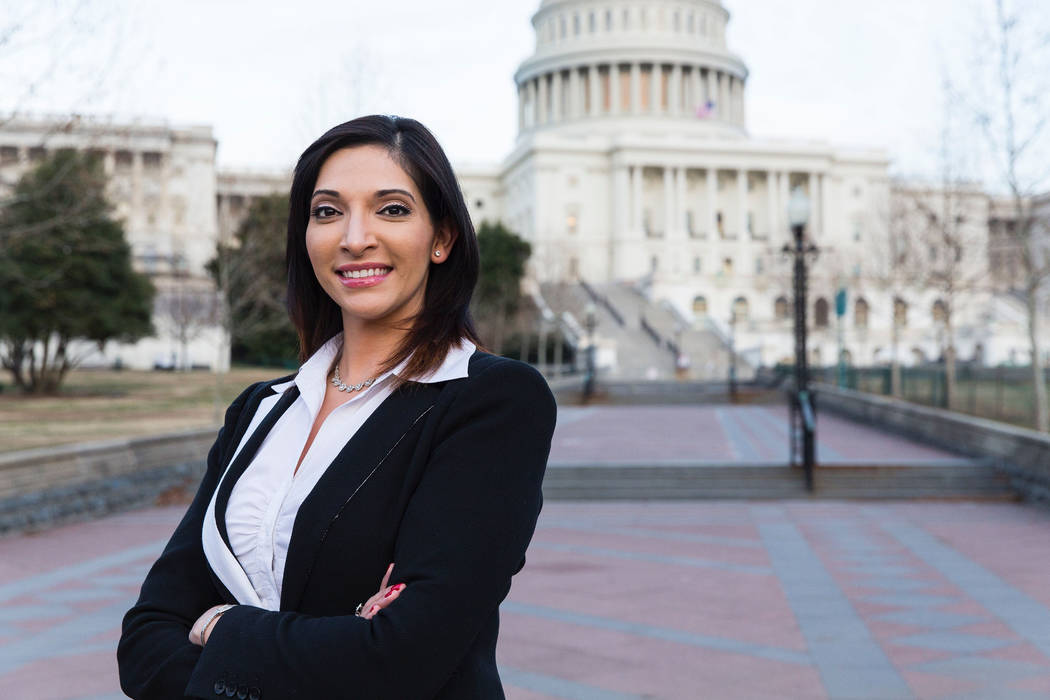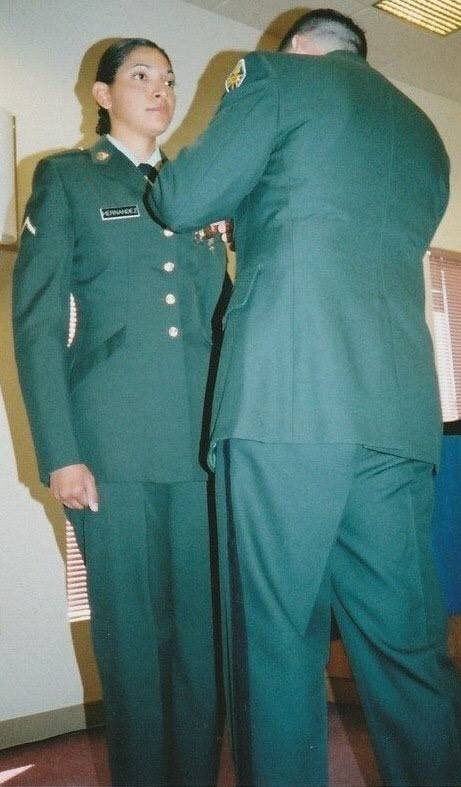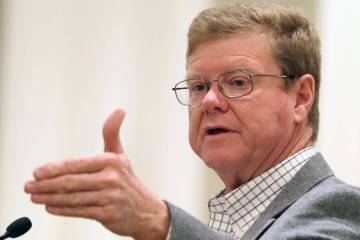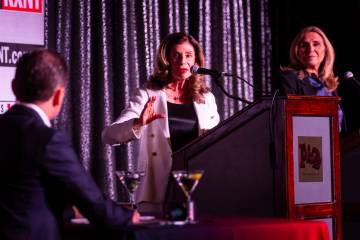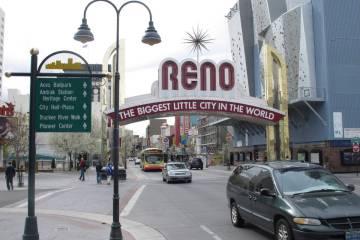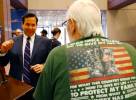Las Vegas woman goes from homeless to White House fellow
At age 17, Cristina Hernandez found herself homeless in Las Vegas. She could have been sucked into a world where she would have to scrounge to survive. Instead, she chose to create opportunities.
Hernandez succeeded so well that today at age 33, she has hit the sweet spot in Washington, landing a coveted White House fellowship.
The fellowship program was established in 1964 and attracts the best and the brightest from a range of backgrounds. It has served as a springboard for many familiar names – former Secretary of State Colin Powell, CNN medical correspondent Sanjay Gupta and Transportation Secretary Elaine Chao. It’s a safe bet this is not the last time you will see Hernandez in the news.
It has not been an easy, or direct, path for Hernandez, whose friends call her Nina. Her father has been out of the picture since she was 7. She doesn’t want to talk about what happened in her family to cause her to become homeless; she will say only that suddenly her 15-year-old brother and she were no longer living with her mother, stepfather and younger sister.
After she turned 18 and graduated from high school, Hernandez enlisted in the U.S. Army. As an older sister, she grew up feeling like a protector, Hernandez explained, and the Sept. 11 terrorist attack made her want to go into service. She also hoped that the move would help her get custody of her brother, although that “didn’t work out.”
Hernandez did tours in Iraq and Afghanistan, volunteering to be deployed to Iraq. “This gave me the opportunity to cross-train. Though I was an imagery analyst, I deployed to Iraq to support interrogations at a prison (after the Abu Ghraib scandal).”
A big believer in grabbing opportunities, Hernandez also volunteered for mail duty because it was vital for soldier morale. The small Forward Operating Base where she was stationed had limited internet and phone connectivity, she said, “so in addition to interrogations support, I would also volunteer to go on convoys to Baghdad to pick up mail for the soldiers I was serving with.”
The event that changed everything
In 2006, Hernandez left the service and returned to Las Vegas. Then age 22, she enrolled at UNLV as a political science major. To make ends meet, Hernandez worked full-time, starting out as a security guard at The Venetian, and then the Palazzo.
She was working her way up the ladder, when the economy hit the skids. In 2008, Hernandez found herself one of 40-plus employees who received pink slips.
Then came the event that changed everything.
Before Hernandez returned to Las Vegas, her younger brother Josue Emmanuel Hernandez-Chavez had enlisted in the Army. He informed his sister over the phone while she was in Germany.
“He wanted to surprise me,” Hernandez said. “I was not exactly thrilled.”
“I knew he was going to do exactly what he did,” she recalled. Her brother became a member of one of the most prestigious arms of the military and pushed himself to excel. “We all know how that ended.”
It ended on Oct. 26, 2009, when the 23-year old flight engineer died in an MH-47 Chinook helicopter crash in Afghanistan. According to the Military Times, six other special operation troops died in the crash. He was on his sixth deployment.
“They were best friends,” said Claudia Nunez, who befriended Hernandez when they were teens. “She always talked about her brother and still does. I can’t imagine a prouder sister.”
“I think that losing him so young really changed my perspective in life,” Hernandez said. “I don’t take a single day for granted. I started living my life a little differently.”
Pursuing a career in intelligence
Hernandez received her Bachelor of Arts from UNLV in 2010 and had begun work as a contractor who trained military personnel at Nellis Air Force Base. She then moved to the Washington, D.C., area to pursue her career in intelligence and use her expertise in training hundreds of U.S. troops and intelligence analysts for missions around the world.
From November 2012 to November 2013, Hernandez worked as a defense contractor in Afghanistan. She worked as an image scientist “to provide technical support to units like my brother’s so they were as prepared as possible before going out on missions.”
She had become a senior policy adviser to the director of science and technology for the Office of the Director of National Intelligence when she applied to Harvard’s Kennedy School of Government midcareer master program in Public Administration.
The world was changing. Many veterans and national security experts were looking for a new adventure in public service.
Hernandez had matriculated from UNLV to the elite halls of academia.
“You’re not there if you’re not an ambitious person,” said Joe Sakran, a trauma surgeon and fellow program student who befriended her.
“She has an extremely strong work ethic. I do think she’s competitive, ambitious, achievement-oriented,” Sakran said – and she’s “authentic.”
Sakran recalled a leadership class at the Kennedy School that was so popular that students had to bid to get into the class and the professor had to turn away students. Hernandez didn’t bid enough points, but that did not deter her.
To the contrary, Hernandez and a few other students not only audited the class, they began turning in assignments. Eventually, the professor enrolled her and gave her course credit, Sakran said, because of “the dedication and enthusiasm that she brought to the table.”
Hernandez succeeded because she was “not always willing to take no for an answer,” Sakran said.
Moving on to the White House
Hernandez had never heard of the White House fellow program – its purpose is “to provide gifted and highly motivated young Americans with some firsthand experience in the process of governing the nation” – until she hit the books in Cambridge. She decided to apply because she likes to open doors that she once did not know existed.
The application process takes weeks. Sakran was one of the friends who helped Hernandez prepare with mock interviews.
“People like her and us, we don’t get those kind of opportunities,” said Nunez, who went to school and became a registered nurse and mother, while her friend traveled around the world, even landed in the White House.
Her fellowship project put Hernandez in the Office of Personnel Management, where she is working to advance an executive order signed by President Donald Trump to “create a lean, accountable, more efficient government that works for the American people.”
To Nunez, it started with Hernandez joining the military.
“Not a lot of young people have that courage, especially living in a town like this where you can really make some big money working a regular job,” she said.
Little sister Mayra Hernandez thinks her sister was driven before their brother’s death.
“She was always very hard on herself. To me, she was working full-time, she was going to school full time,” said Mayra, a stay-at-home mom. “To me, that’s huge. For her, that’s not doing enough.”
As Nina Hernandez steps away from national security, she has been looking to her past. Her passion, she said, is to help underprivileged youth.
“And the reason I say that is, I think they are the toughest portion of our population that people may not be as willing to help,” she said. “I really want to invest in underprivileged youth to show them it’s possible to have positive outcomes. It’s possible to change the trajectory.”
Nunez said of her old friend, “To me, she is the American dream.”
Contact Debra J. Saunders at dsaunders@reviewjournal.com or 202-662-7391. Follow @DebraJSaunders on Twitter.
Former White House Fellows
— Samuel Brownback, former U.S. senator and governor of Kansas
— Elaine Chao, former Secretary of the Department of Labor, currently Secretary of Transportation
— Wesley Clark, Retired General, U.S. Army
— Paul Gigot, Editor, The Wall Street Journal
— Doris Kearns Goodwin, Historian/Author
— Sanjay Gupta, CNN Chief Medical Correspondent
— Colin Powell, Former Secretary of State, Chairman of the Joint Chiefs of Staff
Source: White House Fellows Foundation and Association
Nina Hernandez's tips for success
—Raise your hand.
"Be open to opportunities and jump on opportunities." Hernandez said she frequently volunteered for tasks others did not want to do. "I would always volunteer and raise my hand."
—Don't be afraid of assignments that may not appear attractive or glamorous – they could open new doors.
—Don't be afraid of stepping outside your comfort zone.



